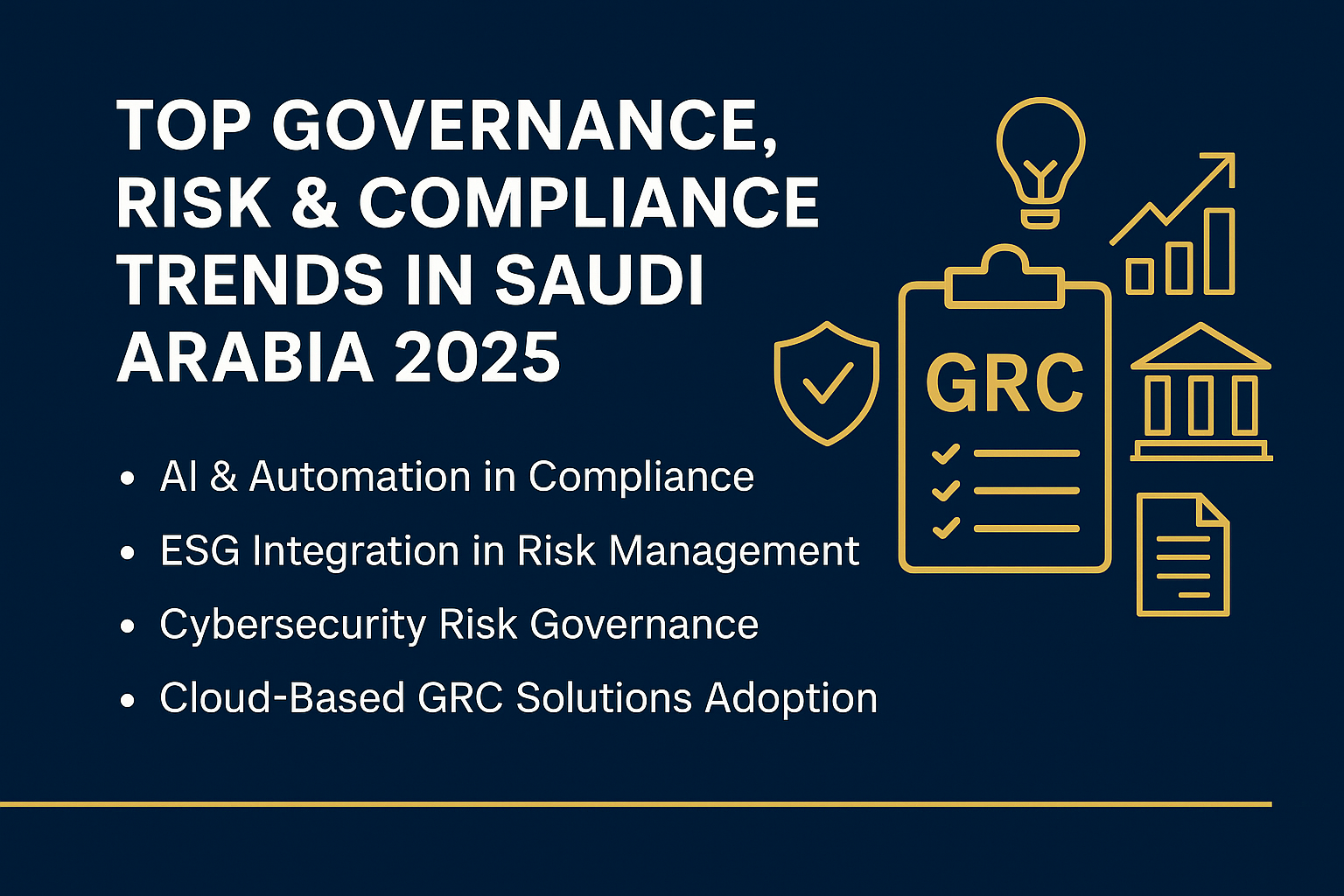
Introduction
Did you know that over 85% of Saudi businesses are planning to upgrade their GRC (Governance, Risk, and Compliance) frameworks by 2025? With Vision 2030 driving rapid regulatory, technological, and economic transformation, GRC has moved from being a regulatory necessity to a strategic priority. As Saudi Arabia’s business landscape becomes more complex, keeping pace with GRC trends is vital for resilience, reputation, and regulatory alignment. This blog explores the top GRC trends Saudi Arabia businesses must watch in 2025, highlighting innovations, challenges, and actionable strategies.
What is Governance, Risk & Compliance (GRC) ?
Governance, Risk, and Compliance (GRC) refers to the integrated collection of capabilities that enable an organization to achieve objectives reliably, address uncertainty, and act with integrity. In Saudi Arabia, GRC ensures that businesses align with Vision 2030, meet regulatory expectations from bodies like SAMA, CMA, and SFDA, and manage risks proactively.
Why GRC Trends Matter for Saudi Businesses in 2025
-
Aligning with Vision 2030’s focus on transparency, accountability, and ESG.
-
Adapting to dynamic regulations from SAMA, CMA, ZATCA, and others.
-
Managing risks from digital transformation, cyber threats, and ESG mandates.
-
Meeting investor and stakeholder expectations for sustainable, ethical business practices.
Key GRC Trends in Saudi Arabia 2025
AI & Automation in Compliance
Saudi businesses are increasingly adopting AI-powered GRC tools for real-time monitoring, predictive analytics, and automation of compliance tasks, reducing manual effort and error rates.
ESG Integration in Risk Management
Environmental, Social, and Governance (ESG) factors are becoming integral to risk frameworks. Businesses are embedding ESG metrics into risk assessments to ensure sustainable growth.
Cybersecurity Risk Governance
With rising cyber threats, organizations are prioritizing integrated cybersecurity governance within their GRC models to protect data and ensure business continuity.
Cloud-Based GRC Solutions
Cloud adoption is enabling scalable, flexible, and cost-effective GRC platforms that support remote work and cross-border compliance requirements.
Data Privacy & Sovereignty Compliance
With stricter data privacy laws and national data sovereignty mandates, Saudi companies are focusing on local data storage and compliant data governance practices.
Challenges for Businesses in Adopting GRC Innovations
-
Integrating modern GRC tools with legacy systems.
-
Shortage of GRC and ESG expertise in the local talent pool.
-
Balancing costs of technology adoption with ROI.
-
Navigating overlapping or evolving regulations.
Solutions & Best Practices
- Adopt scalable GRC frameworks that align with Vision 2030 and international standards.
- Invest in AI-driven platforms for efficient compliance management.
- Prioritize ESG in governance by setting measurable goals and transparent reporting.
- Upskill internal teams on GRC and regulatory updates through continuous learning.
- Engage local and global GRC experts for implementation support.
Case Studies & Examples
- Saudi Bank: Implemented AI-driven GRC tools that reduced compliance reporting time by 40% and improved risk detection.
- Retail Group: Enhanced cybersecurity governance, achieving ISO 27001 certification and minimizing data breach risks.
Conclusion
GRC trends in Saudi Arabia 2025 are reshaping how businesses approach governance, risk management, and compliance. By embracing innovations like AI, ESG integration, and cloud solutions, Saudi companies can strengthen resilience and align with Vision 2030 goals. The path forward demands a balance of technology, talent, and strategic planning.
